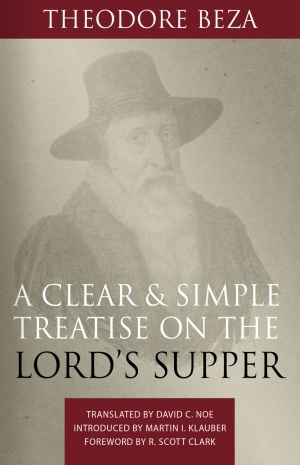Intinction is the practice of administering the Lord’s Supper (Holy Communion) by dipping the bread into the wine rather than by giving the cup directly to the laity. It is not in itself a denial of the cup but arguably it is . . . Continue reading →
communion
How Old Must A Child Be To Come To The Lord’s Table?
How old must a child be to come to the Lord’s Table? We know from the nature of the two sacraments (covenant signs and seals) instituted by our Lord that infant communion (paedocommunion) is an error. It confuses the sign of renewal . . . Continue reading →
Should You Give Yourself Communion At Home?
Joe writes to ask Hi Dr. Clark, My church is currently streaming service online and advocating for family worship at home. They are also encouraging us to get bread and juice/wine and take communion during service hours with our families. Is this . . . Continue reading →
With Presbycast On Virtual Communion—UPDATED
Regular readers of this space will know that I am a regular (or perhaps, more properly, an irregular) guest of the Presbycast podcast hosted by Brad Isbell (Chortles Weakly) and Wresbyterian. This is a valuable (if sometimes quirky) resource for the confessional . . . Continue reading →
Herman Witsius Contra Intinction
XXV. Next follow the actions of the disciples, and consequently of the other guests. And these, according to Christ’s appointment, are three: first, to receive both the bread and the cup; but each separately, for so Christ distributed them: in this manner . . . Continue reading →
Owen Gives Us Theological Reasons To Object To Intinction
2. The special object of faith, as justifying, is not the special object of faith in this ordinance. The special object of faith, as justifying, is the promise, and Christ in the promise, in general, as “the Saviour of sinners:” so when . . . Continue reading →
Now On Sale For $10.00: Beza On The Lord’s Supper
The Lord’s Supper Is Not Penance
In our course on the Reformed Confessions the end of the semester brings us near the end of the Belgic Confession, to article 35 on the Lord’s Supper. It is a marvelous confession of what God’s Word teaches us about the nature . . . Continue reading →
Heidelcast 222: A Question & Answer Cornucopia
In this episode Dr Clark answers Heidelcalls, texts, and mails with questions, questions, and more questions from 1) Aaron about “covenant renewal worship” (is this a “federal vision” thing or may orthodox Reformed Christians talk this way?); 2) Ritchie (from Ireland) about . . . Continue reading →
Withholding The Chalice in Protestant Practice
Intinction And The Loss Of Symbolism
The Lord’s Supper is a sacrament the administration of which has been influenced by the health of the culture at the time. This past summer, I interned at a church and attended meetings where the staff discussed how to administer the Lord’s . . . Continue reading →
The New Covenant In My Blood (Luke 22:20) (part 2)
“Do not think that I will accuse you with the Father” says Jesus. “There is one that accuses you, even Moses, in whom ye trust. For had ye believed Moses, ye would have believed me, for he wrote of me. But if . . . Continue reading →
The Fundamental Significance Of The Lord’s Supper (pt 1)
The most salient fact connected with the institution of the Lord’s Supper is, of course, that this took place at, or, to be more specific, in the midst of, the Passover Meal. It was “while they were eating” the passover meal, Jesus, . . . Continue reading →
The Fundamental Significance Of The Lord’s Supper (pt 2)
The reason why Christ made a change to the symbols representative of his sacrificed self is obvious enough. He to whom all the Paschal lambs from the beginning had been pointing, was about to be offered up. The old things were passing . . . Continue reading →
Fed By Christ Or The Person Next To Me?
One of the recurring questions I get is about the meaning of body in 1 Corinthians 11:28. The question is whether “discerning the body” in Paul’s narrative refers to “being cognizant of the congregation” or to discerning Christ’s physical, actual body and blood, . . . Continue reading →
Fencing The Table Or The Scandal Of The Church
Perhaps nothing so scandalizes the contemporary (i.e., modern) church as the attempt by the visible church to obey the teaching of Jesus and the teaching of the Apostles concerning the Lord’s Table. I say this for three reasons: 1) recently I have . . . Continue reading →
The Black Rubric And The Creator-Creature Distinction
The “Black Rubric” was so-called because it was set in black print in the 1661–1662 edition of the Book of Common Prayer. It was first inserted into the Second Edwardian Prayer Book in 1552. It was intended to explain that when communicants . . . Continue reading →
O. Palmer Robertson Against Intinction
Dipping the bread into the wine as a method of distributing and receiving the elements of the Lord’s supper is a matter that has recently come into discussion among some churches. This procedure, commonly called “intinction,” has significance in the life of . . . Continue reading →
Two PCA Pastors Arrested In Separate Cases
Two teaching elders from the Presbyterian Church in America are facing criminal charges in separate cases. The first case involves a pastor in Florida who was the driver in a fatal car crash. The second case involves a pastor in Mississippi who . . . Continue reading →












